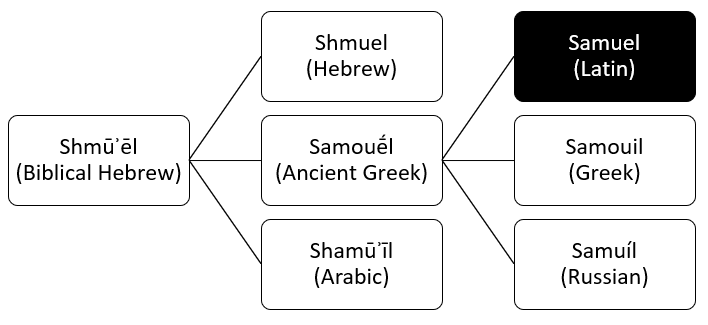
Samuel, your name is really cool! It’s the name of a biblical figure and has been borrowed into many languages, wherever Abrahamic religions show up. It has two possible meanings. The first is Shmū’ēl “Name of El Elyon.” The second is based off the passage in the Torah describing why Hannah gave her son this name, Sha’ul me’ēl “asked of El Elyon.” The first part of this phrase, Sha’ul became known later on as Saul, linking the figures Samuel and Saul through their names as well as their histories.
To translate this into Elven languages, we’ll have a challenge to overcome. It’s a name with another name in it, and that other name is the name of a popular deity of our world. I wrote an article breaking down this second conundrum in detail here: Challenges in Translating Names from Our World. To sum up the approaches that I recommend in fewer words, I’ll translate this name three ways:
- Using Eru Iluvatar to stand in for El Elyon.
- Using the generic word for a god since that’s what the El part of the name means.
- Just not translating the name at all. Él is a word for “Star” in Elven languages, so it fits in phonetically, and it’ll be a little weird, but not too bad. Kinda mysterious sounding, if you ask me.
Quenya
Let’s start with “Name of El Elyon.” For the first part of the name, we’ll use Eru, Aino, Vala, and Él. For the second part, we’ll use the word “Esse – name.”
Gender neutral versions: Eruesse, Ainuesse, Valesse, and Élesse.
Masculine versions: Eruesso, Ainuesso, Valesso, and Élesso.
Feminine versions because many languages have turned this into a feminine name as well: Eruessie, Ainuessie, Valessie, and Élessie.
When translating “asked of El Elyon,” the first element will be the translations of Ēl: Eru, Aino, Vala, and Él. For the second part, we’ll take two verbs that mean “to pray for, to petition for” (Arca– and Hyam-) and turn them into passive participles (Arcaina and Hyamina). When we combine these with the name suffix at the end, the resulting meaning will be “El’s Prayed for One.”
Gender neutral versions: Eruarcaina, Eruhyamina, Ainuarcaina, Ainuhyamina, Valarcaina, Valahyamina, and Élarcaina.
Masculine versions: Eruarcaino, Eruhyamino, Ainuarcaino, Ainuhyamino, Valarcaino, Valahyamino, and Élarcaino.
Feminine versions: Eruarcaine, Eruhyamine, Ainuarcaine, Ainuhyamine, Valarcaine, Valahyamine, and Élarcaine.
When it comes to using these names for characters in Middle-earth, none of these names work. Élesse sounds like it could be “star-name”, but Elves don’t have names with the noun “name” in them. Furthermore, In Elven culture, it’s fine to have a name referencing a deity as long as the name is about the person’s relationship with the deity, not trying to impersonate the deity. Which is possible because sometimes deities clothe themselves in elven or human bodies to walk amongst them, so a person who looks like an old man popping up and saying, “Hi! I’m a maia named Olorin,” is perfectly plausible. Don’t try to pass yourself off as a deity. Please.
So, most of the name has to be thrown out. Let’s go back to the original Hebrew name and think about what this name is about. In the verse (Samuel 1:20) talking about how his mother came up with the name, she says that she asked for her child from El, and that means he’s a borrowed piece of El. So, let’s translate this as “Prayed for One.” The adjectives without name suffixes can be used as gender neutral names, Arcaina and Hyamina. As masculine names they’d be Arcaino and Hyamino, and as feminine names Arcaine and Hyamine.
Sindarin
Starting with “Name of El Elyon.” For the first part of the name, we’ll use Eru, Balan, and Êl. For the second part, the Sindarin word for “name” is Eneth.
Put these together and you get gender-neutral names: Erueneth, Balaneneth, and Eleneth.
Now for the more complex one, “Asked of El Elyon.” Sindarin doesn’t have any words for “to pray/petition/ask for.” To get such words, we’ll have to dip into fanmade vocabulary. We have one fanmade word based on the Quenya word Hyam– that we talked about above: *Hav-. Its passive participle is *Hammen. Combine these and you get these gender-neutral names: Eruchammen, Balachammen, and Elchammen.
As it is for the Quenya, these names just don’t work in a Middle-earth context. We can use the same solution that we came up with for the Quenya version, if you don’t mind using *Hav-. Adding a masculine name suffix makes Hammenor, and the with a feminine name suffix makes Hammeneth.
If using a fanmade word is a little too risky for you, you can go with the word for “given” in Sindarin, Annen. With a masculine name suffix it’s Annenor, and with a feminine name suffix it’s Anneneth. As names, these are very vague, and honestly, more like a Father-name. When Elves speak about new babies being born, they say “a child was given/added to us.” So, this name is super vague, and maybe in that family it’s the name given to the baby of the family.
![]()
Samuel, I hope you found this article interesting and got something useful from it!
If you’d like your name translated in this series, comment below and I’ll consider it for a future article!
Sources:
Chatting with my friend HoverKing on Discord who studies Hebrew. Many of the sources I found mix Ishmael (Ishmāʕ’ēl) and Samuel (Shmū’ēl) up. Easy mistake to make for English-speakers, since the word for “name” is Shem (Shmo = ‘his name’) and the root for “to listen to” is SH-M-ʕ, and the ʕ is often lost in the Romanization of the Hebrew names.
Hanks, Patrick & Hodges, Flavia. A Dictionary of First Names Oxford University Press. 1990. pg 293-4. (This source suggests the connection between Samuel and Saul’s names.)

Hello, I discovered the articles about names translation just a few days ago and I find that very interesting. Since a few years I also translate sometimes the names of my friends, mainly in Sindarin and I am questioning about the order of the words in a name containing multiple words. I generally follow the order of the base name, so for Samuel, the first part means “name” and the second part “god”, which makes Enetheru, would that be incorrect? If it is, how can we know in which order to put the words?
Also, I often use my elvish name that I translated and I would be interested in knowing how you would translate it. It is Frédérick, which comes from “frid” which means peace and “ric” which means ruler in Germanic. I translated it to Sîdharan, but since my skills in elvish are limited, I would really like it to be translated.
Thank you !